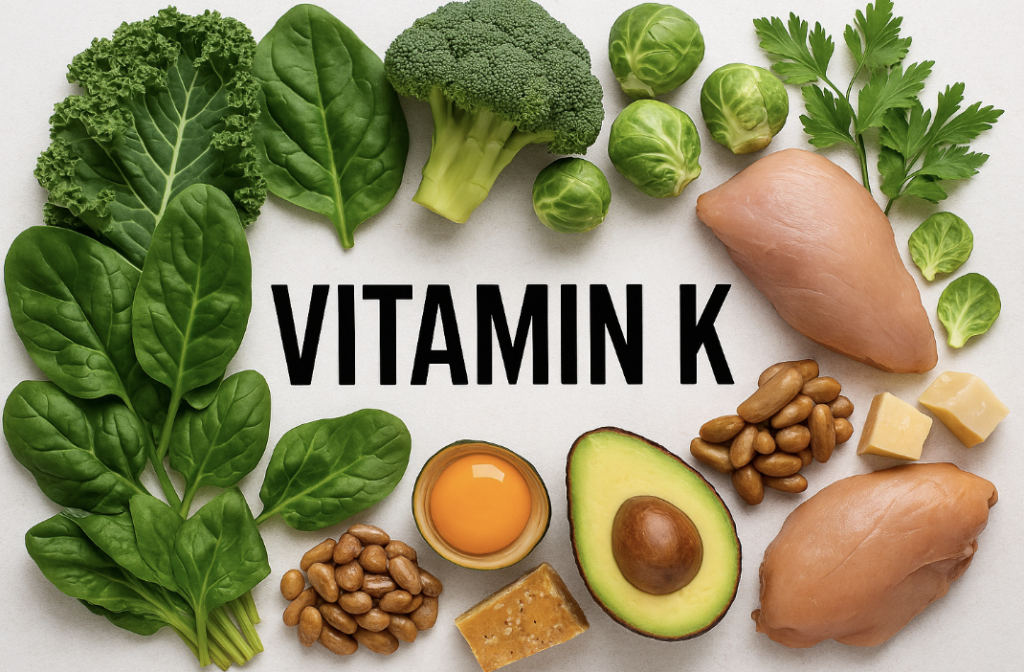Vitamin K is a fat-soluble nutrient that plays a crucial role in blood clotting, bone strength, and heart health. While it’s often overshadowed by other vitamins, vitamin K is key to maintaining long-term vitality—especially as we age. In this guide, you’ll learn how vitamin K supports the body, the difference between K1 and K2, signs of deficiency, top food sources, and who may benefit from supplementation.
What Does Vitamin K Do in the Body?
Vitamin K is best known for its role in helping blood clot properly, but it also helps activate proteins that keep calcium out of arteries and in your bones.
✔ Key Functions of Vitamin K:
- Activates clotting factors to prevent excessive bleeding
- Helps regulate calcium in the bloodstream
- Strengthens bones by activating osteocalcin
- Prevents arterial calcification and supports heart health
- Supports dental and connective tissue health
💡 Did You Know? Vitamin K works synergistically with vitamin D to manage calcium deposition in the body.
Types of Vitamin K: K1 vs. K2
✔ Vitamin K1 (phylloquinone):
- Found in leafy green vegetables
- Primarily supports blood clotting
✔ Vitamin K2 (menaquinone):
- Found in fermented foods and animal products
- More bioavailable and supports bone and cardiovascular health
💡 Subtypes of K2 include: MK-4 and MK-7 (MK-7 is longer-lasting and preferred for supplementation)
Top Health Benefits of Vitamin K
✔ 1. Promotes Healthy Blood Clotting
Prevents easy bruising, heavy menstrual bleeding, and prolonged wound bleeding.
✔ 2. Strengthens Bones and Reduces Fracture Risk
Vitamin K helps deposit calcium into bone tissue, lowering osteoporosis risk.
✔ 3. Protects Cardiovascular Health
K2 prevents calcium buildup in arteries, lowering heart disease risk.
✔ 4. May Improve Dental Health
Vitamin K2 supports the mineralization of teeth and overall oral bone structure.
✔ 5. Supports Brain Function in Aging
Emerging research links vitamin K to cognitive function and reduced inflammation in the brain.
Signs of Vitamin K Deficiency

⚠️ Common Symptoms:
- Easy bruising
- Excessive bleeding from wounds or gums
- Heavy menstrual bleeding
- Weak bones or frequent fractures
- Arterial calcification in advanced cases
💡 At-Risk Groups:
- People taking blood thinners (e.g., warfarin)
- Newborns (often given a K shot at birth)
- People with fat malabsorption (e.g., IBS, celiac disease)
- Long-term antibiotic users
Best Food Sources of Vitamin K

🥬 Vitamin K1 (Leafy Greens):
- Kale, spinach, collard greens
- Broccoli and Brussels sprouts
- Romaine lettuce and parsley
🍳 Vitamin K2 (Fermented & Animal-Based):
- Natto (fermented soybeans – highest K2 food)
- Egg yolks
- Hard cheeses
- Liver and other organ meats
- Chicken thighs
💡 Tip: Since K is fat-soluble, eat it with a healthy fat (like olive oil or avocado) to boost absorption.
Recommended Daily Intake (RDI)
- Adult men: 120 mcg/day
- Adult women: 90 mcg/day
- Pregnancy & lactation: 90–120 mcg/day
Vitamin K Supplement Considerations
💊 Forms Available:
- Vitamin K1 (phylloquinone)
- Vitamin K2 (MK-4 and MK-7)
⚠️ Interactions:
- Can interfere with anticoagulant medications (e.g., warfarin)
- Always consult your doctor if you’re taking blood thinners
💡 Tip: MK-7 (K2) stays in the body longer and is more effective for bone and heart benefits.
Pros and Cons of Vitamin K
✔ Pros:
- Crucial for blood clotting and bone strength
- Supports heart and brain health
- Easy to get from leafy greens and fermented foods
⚠️ Cons:
- Often overlooked in standard multivitamins
- K2 is harder to find in typical Western diets
- Interacts with blood-thinning medications
Vitamin K may not get the spotlight, but its impact on your health is massive—from helping blood clot to keeping your bones and arteries in check. By including both leafy greens (K1) and fermented or animal-based foods (K2) in your diet, you can optimize your intake and reduce your risk of bone loss, bleeding, or cardiovascular issues.
Read more on folate and its role in pregnancy and DNA repair
Learn more about vitamin K from the National Institutes of Health
